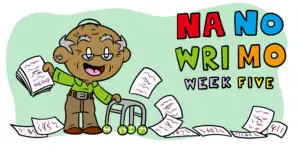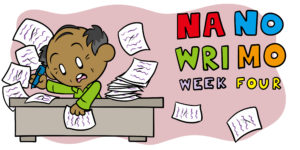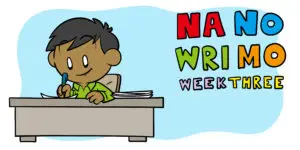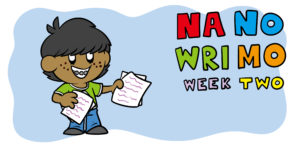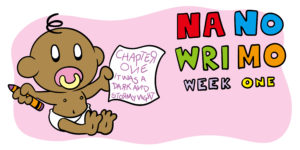Can you write a novel in a month? That’s the question NaNoWriMo poses writers all over the world, whether they’re amateurs or seasoned professionals. Can you write a novel of 50,000 words in a month?
Well, can you?
It’s certainly a tricky thing to do, and to the uninitiated can feel a daunting task. But the answer is a resounding yes.
Here’s an easy 4-step strategy to help you find your NaNoWriMo stride.
1. Construct a plan
Planning is sometimes regarded as unnecessarily restrictive. Writers often despair at the thought they must know beforehand exactly when and where a particular event takes place, how a character will arrive at this setting and at what time. It just seems too boringly functional.
But planning out a story is, in essence, just an extension of the imaginative toil you’ve already put in. If you have any idea at all about what your story is going to be about, then you already have a cast of characters, some interesting scenes, and probably an idea of how your story will end.
So why not formalize it in some way?
One huge benefit of planning out a story beforehand is that you’re no longer forced to juggle dozens of little bits of information around in your head. You’re free instead to refer to a sheet of paper, or a file on your computer, and join the dots as you write.
It’s the writing itself that frees your story from the trappings of formula. And NaNoWriMo, if it’s about anything, is about writing.
2. Use NaNoWriMo as a springboard
Of course, you may not have a story bubbling away as you approach the tail-end of October. You may not even have a single character in mind. So what do you do when the clock-hands toll midnight and November is upon you?
You write. It’s as simple as that.
You’ve probably heard about automatic writing, the idea that when you sit down at your desk, instead of worrying about coming up with a powerful opening sentence, you write whatever comes to you. Never mind spelling. Never mind punctuation and grammar. Just get words on the page.
NaNoWriMo is the perfect place to do just that.
Realistically, there are few writers who, on the first of December, will be entirely satisfied with what they’ve written. But for every misspelling, every error in pacing or sloppy metaphor, there will also be a passage that sparkles with promise. The writer’s task, then, is to discern the diamond from the rough; to mine it; to refine it.
It doesn’t matter whether you went into November with a story in mind, a plan on paper, or with nothing but your typing fingers. What matters is what you do with the words you’ve put down.
3. Make Friends
Writing is a strange and solitary business. You sit alone in a room all day, thinking in other people’s voices, writing out their lives and hopes, their failures and disappointments. But if you ever intend for your work to be read by an audience, there comes a time when you must first share it with someone. And the input those early drafts receive can be hugely important in determining how your story moves forward.
It’s somewhat of a surprise, then, that NaNoWriMo’s network of forums, which are constantly throbbing with useful tips and some good old-fashioned moral support, are sometimes overlooked by the casual observer. There are literally thousands of posts on hundreds of threads on dozens of forums on NaNoWriMo’s official website. And all of them have been posted by people like you.
The chance to network with other writers is an invaluable thing. And when the writing stops, when you emerge bleary-eyed to face another chilly December, it’s useful to know there are others out there doing the same thing; others you can talk to, enter into discussion with.
In fact, it’s exactly this interconnectivity that, in my opinion, is NaNoWriMo’s most admirable achievement. The way it provides the means for writers to start local writing societies, discussion groups and workshops proves that NaNoWriMo is about more than getting people to write, it’s about actively encouraging them to write well.
4. Just Get It Done
But the best way to get the most out of NaNoWriMo is simply to complete your 50,000 word novel.
First and foremost, it shows you’re cut out for a life of writing. You will have proved to yourself that you have the discipline to spend long uninterrupted periods sitting alone at the desk, distancing yourself from any and all distractions.
And writing is, more than anything else, a discipline. Whether you’re just starting out or have been writing for as long as you can remember, NaNoWriMo is something that can truly shape the way you approach writing in the future. Every writer writes at his or her own pace. Stephen King is loath to finish a day’s writing without having completed 2,000 words. Ernest Hemingway rarely wrote more than 500. What both of them share, though, is discipline. And the discipline NaNoWriMo demands of you will inevitably bleed into your later works.
That can only be a good thing.

